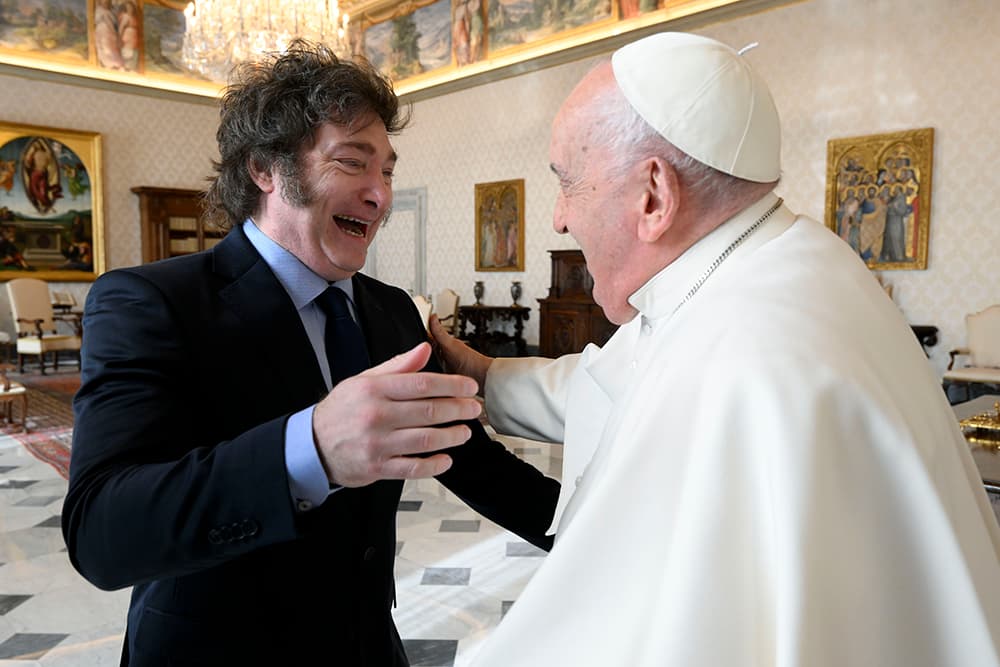ROME – Potentially complicating the prospects of a long-delayed papal homecoming to his native country, a new war of words has opened up between Pope Francis and the government of neoliberal Argentine President Javier Milei over the response to recent protests over pension increases.
The exchange arose after a video shot during street protests last week by workers demanding an increase in pension payments showed a police officer apparently using pepper spray against a 10-year-old girl. In response, Pope Francis used a talk to a meeting of popular movements in the Vatican to criticize not only the security response but also the Argentine government’s priorities.
“I was shown a repression, a week or a little less ago. Workers, people who were demanding their rights in the street,” the pope was quoted as saying.
“And the police repelled them with something that is the most expensive there is, that top-quality pepper spray. And they had no right to demand what was theirs, because they were rioters, communists, no, no. The government stood firm and instead of paying for social justice, it paid for the pepper spray,” he said.
In broader terms, the pontiff also appeared to reject the neoliberal approach of allowing the market alone to determine economic outcomes such as the distribution of wealth.
“If there are no policies, good policies, rational and equitable policies that strengthen social justice so that everyone has land, shelter, work, a fair salary and adequate social rights, the logic of material and human waste will spread, leaving violence and desolation in its wake,” Francis warned.
Adding to perceptions of a direct conflict with Milei, among those in the audience for Francis’s remarks was Juan Grabois, founder of worker’s movement in Argentina and formerly a leftist candidate in the 2023 elections that brought Milei to power.
Milei, who has not been shy about criticizing Pope Francis in the past, took to the social media platform X to fire back. In a series of posts, he referred to the pontiff as a “hypocrite” and also a “zombie infected by the Kirchernerist virus,” a disparaging reference to the leftist governments of former Argentine presidents Nestor Kircher and his wife Cristina, who ruled from 2003 to 2015.
In less acerbic tones, a government spokesman also registered dissent from the pope’s comments.
“It is the pope’s opinion, which we respect, we listen to and we even reflect on what he says,” said spokesman Manuel Adorni. “We do not have to share his vision on some issues. But we have total and absolute respect for what the pope may say.”
Patricia Bullrich, Argentina’s Minister of Security, took a similar line during a press conference, saying of the pope’s comments, “We won’t respond. It’s an opinion, and like all opinions, it should be respected.”
On the other hand, the mayor of Buenos Aires, the capital city Pope Francis served as archbishop for 15 years prior to his election in 2013, challenged the pontiff to come back and see the situation on the ground before commenting on it.
“I have an excellent relationship with many actors in the church, but to give an opinion on these things you have to be here, understand what is happening, take into account all the variables in play and not reduce a fact or listen to only one side of the story,” said Jorge Macri, speaking to an Argentine radio outlet.
Macri is the cousin of former Argentine President Mauricio Macri, who led a conservative government from 2015 to 2019.
I don’t want to get into a debate with the pope,” Jorge Macri said, “and it’s good to hear all the voices on these subjects in order not to be reductionist, and to understand that we’re dealing with a complex and difficult situation, a difficult moment for Argentina.”
Church-state relations in Argentina have been tense since Milei took office in December 2023. In March, a document from a commission of the bishops’ conference came to light complaining that “permanent cuts in public policies have been creating problems that endanger the most elementary rights, like education and health care, and reach even primary needs like food.”
“While tax benefits that favor big companies have not suffered cuts, the deficit is reduced with cuts applied to workers and retired people,” the Peace and Justice Commision document complained.
On Milei’s side, prior to his election he was frequently and opening critical of Pope Francis, referring to him at various points as a “communist,” an “imbecile,” a “leftist son of a b*,” and “the representative of evil on earth.”
Yet after taking power, Milei made a visit to Rome for the canonization of an Argentine saint and held a warm meeting with Francis, which was widely seen as an effort to bury the hatchet.
It remains to be seen if the current turbulence in Argentina may affect the prospects for a papal trip. In recent comments at the of his outing to Asia and Oceania, Francis appeared guarded about a homecoming.
“Whether I will go to Argentina is something that has not yet been decided,” he told reporters. “I would like to go, it is my people, but it has not yet been decided. First we have to resolve several things,” he said, without specifying what those things might be.













